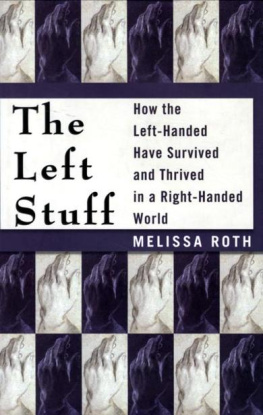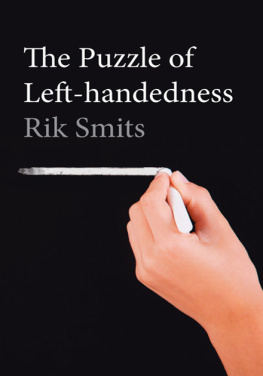ON THE OTHER HAND

2017 Johns Hopkins University Press
All rights reserved. Published 2017
Printed in the United States of America on acid-free paper
987654321
Johns Hopkins University Press
2715 North Charles Street
Baltimore, Maryland 21218-4363
www.press.jhu.edu
Library of Congress Cataloging-in-Publication Data
Names: Kushner, Howard I., author.
Title: On the other hand : left hand, right brain, mental disorder, and history / Howard I. Kushner.
Description: Baltimore, Maryland : Johns Hopkins University Press, 2017. | Includes bibliographical references and index.
Identifiers: LCCN 2016052579| ISBN 9781421423333 (hardcover : alk. paper) | ISBN 9781421423340
Subjects: | MESH: Functional Laterality | Mental Disordersetiology | Attitude
Classification: LCC RC386.6.N48 | NLM WL 335 | DDC 616.8/0475dc23 LC record available at https://lccn.loc.gov/2016052579
A catalog record for this book is available from the British Library.
Special discounts are available for bulk purchases of this book. For more information, please contact Special Sales at 410-516-6936 or .
Johns Hopkins University Press uses environmentally friendly book materials, including recycled text paper that is composed of at least 30 percent post-consumer waste, whenever possible.
To the two left-handers who shaped my life in nonsinister ways:
Gertrude Slotnikoff Klein (19192002)
Carol Rose Rubin Kushner
PREFACE
Strangely, there is little agreement as to precisely how handedness should be defined or measured, yet nearly all people readily identify themselves as being either right-handed or lefthanded.
MICHAEL CORBALLIS (1997)
Left-handers are a lot like Canadians. They immediately recognize one another. My interest in left-handedness, as psychiatrists used to say, is overdetermined: a combination of personal experience overlaid with clinical observations. It began with my own left-handedness. The lack of left-handed desks in my grammar school no doubt contributed to my inability to master the cursive writing skills expected of second-graders in the 1950s. As a result, my penmanship grades remained in the basement for my entire grammar school career. Nevertheless, my teacher, Miss Coyle, predicted that despite my handicap, I would become a writer. Otherwise my left-handedness presented no drawbacks in my childhood. I was an acceptable first-baseman and a useful Little League switch-hitter. Technology saved me. My early attempts at writing took place on an electric typewriter and advanced to a KayPro DOS computer, of which I was an early and eager user.
A generation earlier was quite different. A natural left-hander, my mother was forced to write and sew with her right hand, a practice enforced by educators in the Philadelphia public schools in the 1930s. Unlike some other left-handers who were forced to switch, my mother did not stutter, though she had a number of reading difficulties that she masked but could not overcome. And she was markedly uncoordinated, which she attributed to her forced hand switching. Even today on most of planet Earth, left-handed children continue to be retrained as right-handers and as a result have reading and sometimes speaking disabilities.
The second impetus for this study was clinical, based on my observations of pediatric patients at a movement disorders clinic at Memorial Hospital of Rhode Island, Brown University School of Medicine, in 1994 and 1995. For a book on Tourette syndrome I was working on,During my time at Brown I noticed that the patients with Tourette syndrome and attention deficit disorder (ADD/ADHD) appeared to be left-handed in a greater proportion than the 10 percent of the population expected to be left-handed. To humor me, Kiessling and two other colleagues, Linda Abbot and Joe Hallett, agreed to use the standard Edinburgh Handedness Inventory to determine how many of our patients were indeed left-handed. My hypothesis was confirmed, but the findings were statistically inconclusive due to our small sample size and lack of controls.

The left-handed author, age 3, with his left-handed mother. (Authors personal photo.)
I had planned to undertake a full-blown research project on handedness and pediatric movement disorders. The project was sidetracked, however, by my work with a team of colleagues at the University of California at San Diego on the etiology of Kawasaki disease, a sometimes-fatal pediatric vasculitis. In the fall of 2000 I moved to Emory University, where along with the Kawasaki project I worked on addictions and self-medication by people with chronic diseases, especially those diagnosed with pediatric movement disorders. Again, because a disproportionate number of this population appeared to be left-handed, I was propelled to consider the role of handedness in learning disorders. More than a decade and a half after my experiences at Brown, I resolved to stay focused on the mysteries of left-handedness.
Despite the vast number of articles published on the topic and wide public interest in it, only a few books published in the past half century have tried to provide a comprehensive exploration of the causes and consequences of left-handedness. Five of these are aimed at a popular audience. Michael Barsleys 1966 The Other Hand: A Social History of Left-Handedness, chock-full of entertaining vignettes, is aimed at exposing the historical discrimination against left-handers.
In contrast to Barsleys positive spin on left-handers, British Columbia psychologist Stanley Corens 1992 book The Left-Hander Syndrome: The Causes and Consequences of Left-Handedness emphasized the downside of left-handedness. For Coren, preference for the right hand was normal, while left-handedness, in his words, was right-handedness run amok. According to Coren, left-handedness resulted from a failure to reach right-handedness.
Rejecting both Barsleys positive take on left-handedness and Corens pathologizing is British neurosurgeon and psychologist Chris McManuss Right Hand, Left Hand: The Origins of Asymmetry in Brains, Bodies, Atoms, and Cultures. A tour de force, McManuss book, drawn from his years of investigation into handedness, is comprehensive, authoritative, and persuasive. Using a multidisciplinary approach, McManus examines the biological and cultural underpinnings of asymmetry, destroying the many myths of its origins.
Drawing on a wide range of sources from the Middle Ages to the mid-twentieth century, art historian Pierre-Michel Bertrands Histoire des gauchers: Des gens lenvers (2001) provides a chronology of attitudes and practices toward left-handers moving from hostility to tolerance (or indifference) and, ultimately, to admiration and pride. Bertrands history, however, is not one of unmitigated progress, but rather a narrative of struggle, resilience, and contradiction. A valuable resource, Bertrands book is unavailable in English and in subsequent chapters I have included his ideas and insights in my discussions.
As I was completing my book manuscript, a new bookLaterality: Exploring the Enigma of Left-Handednessby the respected psychologist and researcher Clare Porac was released. A professor at Pennsylvania State University and former collaborator with Stanley Coren, Porac aims to translate the vast and frequently contradictory academic studies on left-handedness into accessible and readable form. Concentrating on twenty-first-century studies, Porac relies mainly on meta-analyses and review articles, especially those by well-known and highly respected researchers.
Next page










